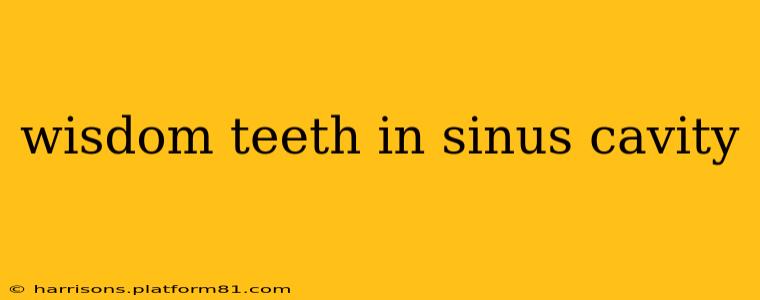Wisdom teeth, also known as third molars, are the last teeth to erupt in the mouth, usually appearing between the ages of 17 and 25. While most people experience no problems with their wisdom teeth, some individuals face complications due to their position within the jaw. One such complication is the proximity—or even intrusion—of wisdom teeth into the maxillary sinus cavity. This article will explore the implications of wisdom teeth located near or within the sinus cavity, addressing common concerns and outlining potential treatment options.
What Happens When Wisdom Teeth Are in the Sinus Cavity?
When wisdom teeth develop close to or within the maxillary sinus (the air-filled cavity behind your cheekbones), it can lead to several issues. The close proximity can make extraction more complex and increase the risk of complications such as:
- Sinusitis: Infection can spread from the tooth socket into the sinus cavity, resulting in sinusitis, characterized by pain, pressure, and inflammation in the sinuses.
- Dry Socket: Although not directly related to sinus proximity, dry socket (alveolar osteitis) is a painful condition that can occur after tooth extraction. This risk can be slightly increased when the extraction is complex due to the proximity to the sinus.
- Sinus perforation: During extraction, the thin bony wall separating the tooth socket from the sinus cavity may be accidentally perforated, leading to a communication between the mouth and the sinus. This requires careful monitoring and may necessitate additional procedures to promote healing.
How Do Dentists Determine if Wisdom Teeth Are Near the Sinus?
Dentists utilize various diagnostic tools to assess the relationship between wisdom teeth and the sinus cavity. These include:
- Panoramic X-rays: These provide a comprehensive view of the entire jaw, allowing dentists to visualize the position of wisdom teeth relative to the sinus floor.
- Cone Beam Computed Tomography (CBCT): CBCT scans offer a three-dimensional image, providing detailed information about the tooth's proximity to the sinus and the thickness of the bony wall separating them. This is often crucial in planning complex extractions.
What are the Symptoms of Wisdom Teeth Impinging on the Sinus?
Symptoms can vary depending on the extent of involvement and presence of infection. Common symptoms include:
- Facial pain or pressure: This is often localized to the cheekbone area and may worsen with chewing or bending over.
- Sinus pain or congestion: Similar symptoms to sinusitis may occur, including headache, nasal congestion, and post-nasal drip.
- Numbness or tingling: In some cases, nerve involvement near the wisdom tooth may cause numbness or tingling in the cheek or upper lip.
- Infection: Signs of infection, such as swelling, redness, and pus, may be present.
How Are Wisdom Teeth Near the Sinus Treated?
Treatment depends on the individual's situation, the position of the tooth, and the presence of any complications. Options include:
- Extraction: This is often the most appropriate treatment, particularly if the tooth is causing symptoms or is at risk of causing complications. The complexity of the extraction will depend on the relationship between the tooth and sinus. Specialized techniques may be needed to minimize the risk of sinus perforation.
- Monitoring: If the wisdom tooth is not causing any problems and is deemed unlikely to cause future problems, the dentist may recommend monitoring its development with regular check-ups and X-rays.
What Happens After Wisdom Tooth Extraction Near the Sinus?
Post-operative care is crucial, particularly after extraction of wisdom teeth near the sinus. The dentist will provide specific instructions, but general recommendations include:
- Careful cleaning: Maintain good oral hygiene to prevent infection.
- Avoiding strenuous activity: Resting and avoiding strenuous activity will aid healing.
- Following prescribed medication: Taking pain medication and antibiotics as prescribed will help manage pain and reduce the risk of infection.
- Avoiding smoking: Smoking can significantly impede healing.
Can Wisdom Teeth Grow Back After Extraction?
No, wisdom teeth cannot grow back after extraction. Once removed, the tooth follicle is destroyed.
How Long Does it Take to Recover From Wisdom Teeth Extraction Near the Sinus?
Recovery time can vary, but it typically ranges from a few days to several weeks, potentially longer if complications occur. The dentist will provide guidance based on the individual's situation. Complete healing of the bone and soft tissue around the extraction site can take several months.
This information is for general knowledge and does not constitute medical advice. Always consult with a qualified dentist or oral surgeon for diagnosis and treatment of wisdom teeth or any other dental concerns. They can assess your specific situation and recommend the best course of action.
